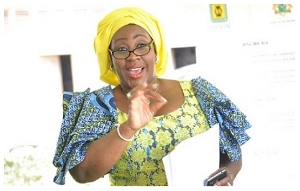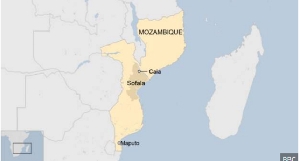Opinions of Friday, 27 July 2012
Columnist: Awuni, Manasseh Azure
Mensa Otabil’s ‘unpastoral’ dress code
Savannah View: Mensa Otabil’s ‘unpastoral’ dress code
The last time I said I had lost hope in Ghana I was severely rebuked. One of Ghana’s finest journalists of all time, Anas Aremeyaw Anas, had invited me to see his exposé on the Tema Harbour. He was almost done with it, but as he has often done, he called me to critique it before the final one came out. At first I didn’t understand why Anas of all journalists would invite me to critique his works until I realised that all real achievers share a common trait – humility.
I felt disgusted as I saw how our own people were colluding with foreigners to rob the country of millions of Ghana cedis. But when I saw from the exposé, how the corrupt officials had made rank nonsense expensive equipment which was procured to forestall the fraudulent acts, I got madder. “I’ve lost hope in this country,” I exclaimed with rage.
“I’m so disappointed that this is coming from you,” Anas told me after a stern look. “That’s why you and I are doing what we’re doing,” he continued. “We must help make this country what we want it be and not lose hope.”
Anas’ words and the seriousness with which he said them left a lasting impression on me, but there are many times I lose hope about the prospects of this country, especially when I look at the political scene. For instance, look at the NDC and NPP fighting over a 14th century cliché of a slogan: “You matter, people matter.” Sometimes one feels ashamed to belong to this nation.
But even in our hopelessness and despair, there are certain individuals who make being Ghanaian a pride. They are people you listen to and sigh thankfully to God for blessing your nation with such brains.
There are three of such people I often call the three wise men of Ghana. One of them is Uncle Ebo Whyte, who presents the Food for Thoughts on Joy FM. Another is Komevi Ameko of Uniiq FM’s As I see It programme. You cannot help but applaud the pearls of wisdom they freely share on air. I appreciate knowledge, but I’m still a firm believer of the fact that “wisdom is the principal thing” as Proverbs 4:7 teaches us. But Efo Komevi and Uncle Ebo are not the subject of my commentary today.
The third wise man of Ghana, in my judgement, also happens to be one of my favourite preachers. He is Pastor Mensa Otabil, the founder and general overseer of the International Central Gospel Church (ICGC).
In a country where vilification and character assassination are virtues, my candid opinion about the man of God I admire is likely to have my inbox inundated with argument from readers on the other side of him. But, hey, opinions are like noses. Some fit as perfectly as though the Creator spent hours carving them. Others also sit so awkwardly that you would think they were hammered hurriedly against the faces they were supposed to adorn. But no matter how my nose looks, it is mine. And such are my opinions.
I’m not a member of the ICGC. I am a staunch Presbyterian. But Mensa Otabil is one of the few preachers I listen to and admire so much. He is modest. Unlike those who compete with God for glory and appellations, he’s content with the title “pastor.” I also like the practicality of his teachings. You need not be a Christian to listen to him.
I cannot assume to have what it takes to appraise sermons so I may come to that subject when I grow up. Today, however, I want to look at the other reason why I admire Pastor Mensa Otabil. It is about his dress code. Have you taken note of the Greater Works billboards in town? And he dresses like that almost all the time.
When I met Pastor Mensa Otabil the other day, he was clad in African print as usual. We met at The Institute of Economic Affairs’ (IEA) conference room, where a workshop for the state security agencies was being held to tell them what they already knew: their role in ensuring a peaceful and violence-free election.
When the workshop broke for coffee (and of course milo and tea), half a dozen journalists rushed to Pastor Mensa Otabil. They all wanted an interview. But he turned them down politely with a smile. He directed that they pass through the formal route if they wanted to have an interview with him. And not many journalists would want to book formal interview appointments.
“As for Otabil, he will never speak,” one of my friends told me, disappointed.
Why should he speak? I asked myself. It was the period Kennedy Agyapong, the Member of Parliament for Assin North, had gone on air to “declare war” against the Ewe and Ga people. And any journalist would have made his news editor happier if they returned from the IEA assignment with Mensa Otabil’s sound bite on Kennedy Agyapong’s pronouncements.
So their disappointment was understandable. But Mensah Otabil’s refusal to grant an impromptu interview was even more understandable; that he did not even listen to the subject of the interview was even more understandable.
We are living in a country where you attend a programme with colleague journalists and when you visit the newsstand the following morning you begin to wonder whether those who splashed the graffiti on the front pages of the tabloids were actually present with you at the same ceremony.
So Pastor Otabil, perhaps, wanted to avoid headlines such as “Mensa Otabil Blasts Kennedy Agyapong, NPP” or “Mensa Otabil Defends Kennedy Agyapong,” and the rest. He wanted to avoid being the subject of attack from party boys who until yesterday were not qualified to bath in the bathroom of compound houses.
Knowing that the man would not speak, I did not ask for an interview. I only shook hands with him and told him how I admired him. And he thanked me and said God should bless me. “AMEN!” I said, and requested that I take a photograph with him.
“Sure, why not,” he said, and I handed over my camera to a female reporter of Citi FM, who took the photograph that would later become the cover photo of my Facebook page. But that photograph is not the subject of this column either.
Pastor Mensa Otabil’s dress code always gives me a perfect example to cite when I’m making a case against our peerless taste for what is foreign. I cannot understand the sanity of walking under the blistering and merciless African sun in three-piece suits when we have our own clothing that are friendly to our weather.
“If you wear suit, it boosts your confidence level as a professional,” one HR manager said when I was engaged in a heated argument with him over the need to promote African wear. But my answer to that is simple: The wearer of the suit who feels confident does not feel confident because of the suit. He or she is suffering from the deadliest psychological disorder called inferiority complex. Professional confidence should emanate from the content of your skull and not the clothes you wear.
The other ‘strong’ point he raised was the fact that every profession comes with its prescribed dress code.
Says who? Whoever threw out a Nigerian delegation out of a UN or business conference because of their outfit? He mentioned banking, the clergy and other professionals to support his claim. And that was where I pointed out to him that clothes do not define profession, apart from the security agencies and those who are required to wear uniforms.
Our men and women of God have taken the love for suits to abysmal levels. Some of the churches where they preach are hotter than the insides of ovens, yet some of them come clad in five-piece suits. And they will always remove the suits midway through the sermon. Some of the ‘modern-day pastors’ go the extra mile of making the brand of their suits the subject of their sermons, if they are talking about how “God has blessed them.”
Event organisers who prescribe dress codes have two classifications: formal or African wear. Who says African prints are informal wears.
Some even go a step further to state that nothing apart from suit is allowed for their programmes. Organisers of the last Ghana Movie Awards said they would throw out anybody who came in any attire apart from suits.
What those who arrived at that lame-minded decision forgot is that if we should all go out and patronise foreign products, we will equally ignore the local movies, some of which are, indeed, the best examples of inferior local products.
We cannot continue to blame our governments of unemployment when every graduate will save their meagre National Service earnings in order to procure an imported suit for their graduation. It is not wise when bankers insist on suits when the local textile industries are collapsing and rendering thousands of people jobless. Will the top designers in European and America come to save with our local banks?
Clothes, I strongly believe, do not define a person or their profession. Well, we all seem to think that suit is the acceptable dress code for pastors. Yet one of the most respected men of God in our country does not wear suit. Does Pastor Mensa Otabil’s ‘unpastoral’ dress code dent his capabilities as a pastor?
The boy from Albert Abongo’s Bongo Constituency wants to know!
Savannah View is a column that appears in The Finder newspaper every Tuesday. Writer’s email: azureachebe2@yahoo.com












